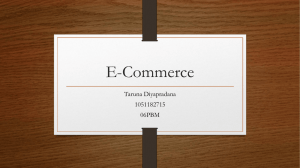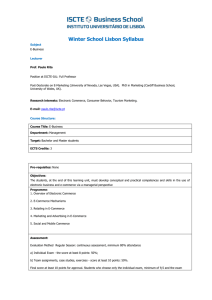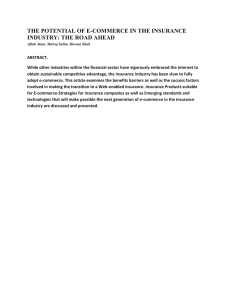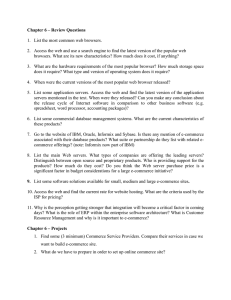T B A
advertisement
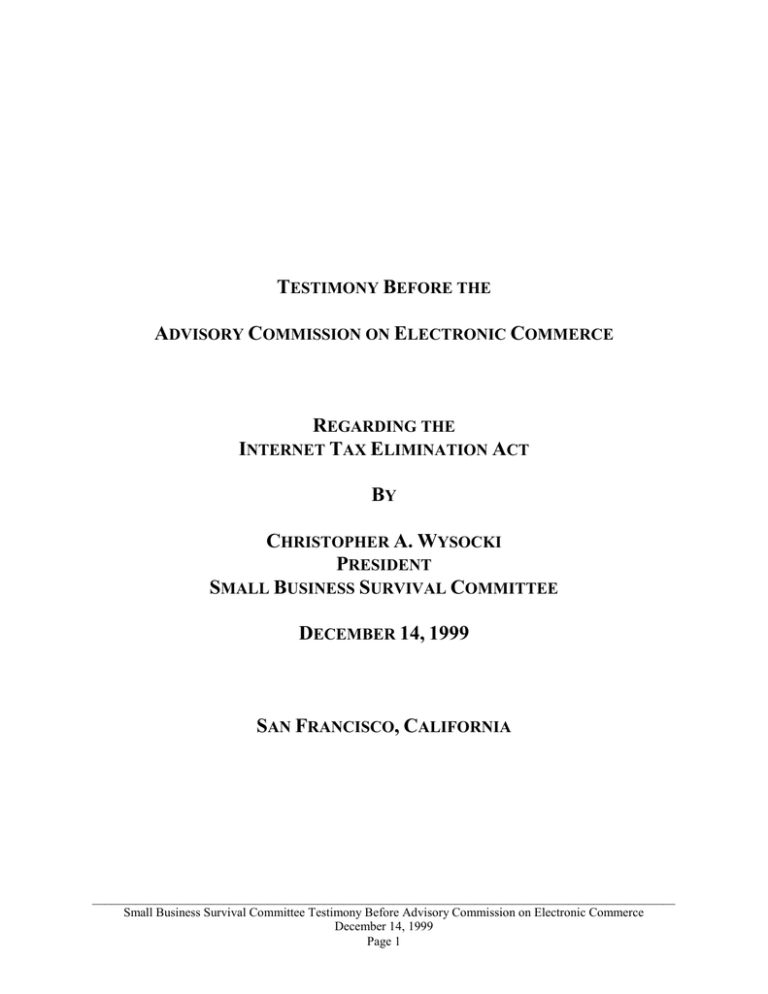
TESTIMONY BEFORE THE ADVISORY COMMISSION ON ELECTRONIC COMMERCE REGARDING THE INTERNET TAX ELIMINATION ACT BY CHRISTOPHER A. WYSOCKI PRESIDENT SMALL BUSINESS SURVIVAL COMMITTEE DECEMBER 14, 1999 SAN FRANCISCO, CALIFORNIA _____________________________________________________________________________________________ Small Business Survival Committee Testimony Before Advisory Commission on Electronic Commerce December 14, 1999 Page 1 On behalf of the more than 50,000 small business men and women who make up the Small Business Survival Committee, I want to thank you for this opportunity to address the Advisory Commission on Electronic Commerce regarding Congressman John Kasich's Internet Tax Elimination Act. My name is Christopher Wysocki, and I am the President of the Small Business Survival Committee (SBSC), a non-partisan, non-profit advocacy organization representing the interests of entrepreneurs across America. The world is in the midst of a new age, and Americans are leading what is being called the digital revolution. More than half of all American homes have personal computers. And according to a recent Department of Commerce study, 32.7% of the U.S. population currently enjoys access to the Internet. The ease and convenience of the Internet has truly been the cornerstone of an economic and cultural revolution that has brought people from across the nation and around the world together in a way that has never been seen before. The growth of e-commerce on the Internet and technological advances in general have largely contributed to the economic expansion that we have seen over the past several years. According to a recent report issued by the United States Department of Commerce, more than one-third of America's economic growth between 1995 and 1998 can be attributed to information technology. Consumers are clearly responding to and embracing the ease and convenience of ecommerce. And, small business men and women are working both hard and smart to meet an increased demand for new and exciting products. The growth of the Internet and e-commerce has made the legislation introduced by Representative Kasich essential to allow for future growth in America. His legislation would specifically make the existing ban on Internet taxes permanent and would also prevent state and local governments from imposing taxes on e-commerce. The policy Mr. Kasich has proposed will guarantee that the American small business owner and entrepreneurial sector of our economy can continue creating new jobs while at the same time providing consumers with added benefits and convenience. I strongly urge this body to adopt Mr. Kasich's legislation as a part of your final recommendation. _____________________________________________________________________________________________ Small Business Survival Committee Testimony Before Advisory Commission on Electronic Commerce December 14, 1999 Page 2 Let me take a few moments to outline some of the broad principles that SBSC believes should be considered and adopted by this advisory commission. First, we must recognize the importance of e-commerce in the new digital economy. Technology and the Internet have given millions of people the opportunity to strike out on their own and bring their entrepreneurial endeavors to the marketplace more quickly and efficiently than ever. This has helped improve the financial future of these individuals, created more high paying jobs and has added tremendously to America's economic growth and competitiveness in the global economy. In addition to the benefits to small business owners and entrepreneurs, consumers are greatly benefiting from the added efficiencies and convenience that e-commerce has brought to our lives. Allowing the taxation of e-commerce would jeopardize the growth of the new digital economy and hamper the ability of entrepreneurs across America to strike out and start a small business. The Internet and electronic commerce are quickly becoming an essential tool for entrepreneurs across America. An estimated 81% of all small businesses have personal computers in their office. And, according to a recent Bank One study, half of those companies with 10 or fewer employees with revenues between $50,000 to $1 million annually have Internet access and 20 percent have their own web sites. The emerging digital economy will only drive this figure up in future years, and attempts to tax electronic commerce will deal a potentially devastating blow to the future expansion of the small business community. We must also consider the harmful effects on the economy as a whole that will result from allowing states and local government to tax e-commerce. According to University of Chicago economist, Austan Goolsbee, "Applying existing sales taxes to Internet commerce might reduce the number of online buyers by up to 24%." A market reduction of this magnitude would be a tremendous blow to our economy, which is becoming increasingly dependent upon ecommerce for continued growth and prosperity. _____________________________________________________________________________________________ Small Business Survival Committee Testimony Before Advisory Commission on Electronic Commerce December 14, 1999 Page 3 The rapid growth and popularity of electronic commerce is undeniable. In 1995, the digital economy was roughly $5.3 billion. In 1998, over $300 billion was spent by consumers on the Internet. With 46 of 50 states having reported budget surpluses last year, SBSC has not found any evidence that e-commerce is jeopardizing the tax base to fund essential state and local government programs. As Harris N. Miller, President of the Information Technology Association of America said, "In this period of unprecedented economic growth, when states are experiencing budget surpluses, changing the Internet tax collection rules is the equivalent of the hatchet falling on the neck of the goose that laid the golden egg." A common misnomer made by policy makers and politicians engaged in the discussion of taxing e-commerce is that such taxation is necessary to make up for "lost revenue." In preparing for today's testimony, I was unable to identify any lost revenue at all to state and local government. To the contrary, the data suggests that state and local governments are experiencing record levels of revenue. A recent Investor's Business Daily editorial stated that state revenues have grown 227% between 1980 and 1995 and local revenues have grown by 193% over the same period. According to the Cato Institute's fiscal policy analysts Dean Stansel and Stephen Moore, between 1992 and 1998 -- the time e-commerce has become increasingly popular -- state tax revenues grew at nearly twice the rate of inflation and population growth. In addition, a recent study conducted by Ernst & Young found that an online tax would have generated less than $170 million for state and local governments in 1998 -- less than 0.1% of all state and local sales and use taxes collected. It is important to realize the power of the Internet when it comes to creating small businesses. Not too long ago, starting a business often took large sums of capital. Access to capital is not and has generally not been available to the vast majority of Americans. In the new digital world of technology and e-commerce, however, men and women have been able to combine their good ideas with their computer and Internet access to search for previously unavailable and distant markets in an effort to sell their goods. Hundreds of thousands of men and women have been able to start a small business or home office as a result of technology and e-commerce. The opportunities that exist for entrepreneurs have never been more prevalent. _____________________________________________________________________________________________ Small Business Survival Committee Testimony Before Advisory Commission on Electronic Commerce December 14, 1999 Page 4 Small businesses that have been built around technology and electronic commerce would be severely threatened if they are suddenly forced to collect and distribute sales taxes to the nearly 7,500 state and local jurisdictions across America that impose sales taxes. Such a change would not only deal a significant blow to the productivity of existing small businesses, but SBSC believes it would significantly reduce the number of men and women who may consider starting their own small company. According to Ernst & Young tax economists Robert J. Cline and Thomas S. Neubig, the compliance cost to small retailers for collecting sales taxes in all 46 states that have a sales tax would be roughly 87% of the amount of taxes collected. However, this figure does include the non-economic costs of sales tax compliance. What is largely immeasurable is the lost productivity. Time spent filing forms, working with bureaucrats in distant areas of the nation, and collecting taxes for thousands of jurisdictions could be better spent finding new markets and hiring more people to help the small business grow. Representative Kasich's legislation is simple and clear. It makes the current moratorium on Internet taxes permanent, and it creates a certain future for e-commerce. His legislation is truly essential to maintaining the economic growth of the past several years. Opponents to this concept clearly are stuck in a tax model that is no longer appropriate nor makes sense for the new cyber-economy. Arguments that center on the harm e-commerce will bring to brick and mortar stores seem to ignore the fact that the new digital economy is here to stay. There has been a lot of recent rhetoric about the need to tax electronic commerce as a way to "level the playing field" between traditional "brick and mortar" stores on Main Street and e-commerce businesses that do not charge or collect a sales tax from their customers. SBSC rejects the claim that Main Street USA is losing customers solely because of the tax free world of e-commerce. Generally speaking, there is no real economic advantage to a consumer purchasing goods online versus going to a store and buying the same products. It is true that a customer who walks into a store to buy a book must pay a sales tax where that same customer could avoid paying sales tax by ordering the book from an e-commerce store. _____________________________________________________________________________________________ Small Business Survival Committee Testimony Before Advisory Commission on Electronic Commerce December 14, 1999 Page 5 However, Internet tax proponents conveniently overlook that the customer who orders his or her book online must pay to have that book delivered. And, the money that customer must spend for shipping is generally more than the amount he or she would have spent on sales tax at the neighborhood book store. A customer would have to spend hundreds of dollars at once on books to see any real price advantage to purchasing online instead of going to the local store. A quick review of shipping rates by the major overnight delivery services shows that the cost of overnight shipping of goods purchased online will more often than not exceed the sales tax paid by the customer. It seems clear that supporters of Internet taxes are using the competitive disadvantage argument in a somewhat disingenuous manner. What advocates of Internet taxes really seem to want is a new source of revenue for state and local government. This is despite the fact that, as Michael Flynn of the American Legislative Exchange Council confirmed, states have enjoyed a $74 billion surplus over the past four years. SBSC views technology and e-commerce as an historic opportunity to be embraced rather than hampered. What other time in history could a mother living in rural Montana compete with the largest corporations in the world? The digital age is an opportunity we must not squander. The Internet and technological innovation has been a tremendous equalizer between small and large business. Where just 10 years ago, only large corporations could afford to sell goods and services on a global level, the Internet and e-commerce has enabled anybody with an idea and a computer with Internet access to market and sell their product from anywhere to any nation in the world. As a final note, I would simply add that this commission has a responsibility to craft a well-reasoned and thoughtful recommendation on policies that will direct the future of ecommerce. Using past tax and regulatory models that are increasingly obsolete will only serve to stifle the entrepreneurial spirit that is fueling an economy increasingly led by new technology and e-commerce. Attempts to tax e-commerce will deal a devastating blow to the growth of the new digital economy. _____________________________________________________________________________________________ Small Business Survival Committee Testimony Before Advisory Commission on Electronic Commerce December 14, 1999 Page 6 I hope this commission finds that any attempts to tax e-commerce will send a terrible signal to small business men and women across America. The burdens that would be imposed are simply unacceptable, especially when online entrepreneurs do not enjoy any real competitive price advantage over traditional "brick and mortar" stores. It is simply not realistic, not to mention fair, to require a small business in the heartland of America be held responsible for the collection and distribution of sales taxes for the nearly 7,500 state and local government taxing authorities across the nation. While major corporations may be able to absorb the costs associated with tax collection and distribution, such a policy will effectively force small business entrepreneurs out of the online marketplace, thereby denying them their rightful place in the new digital economy. As a result, SBSC strongly encourages the Commission to make the Internet a tax free zone in its final recommendation. Mr. Kasich should be commended for his thoughtful approach to e-commerce, and it is an honor for SBSC to state our support for his proposal to the Commission. Small business men and women across America will be truly better off with a ban on e-commerce taxation, and I strongly urge the Advisory Commission on Electronic Commerce to adopt Mr. Kasich's Internet Tax Elimination Act into your final report. Thank you for your time, and I look forward to answering any questions that you may have. _____________________________________________________________________________________________ Small Business Survival Committee Testimony Before Advisory Commission on Electronic Commerce December 14, 1999 Page 7
